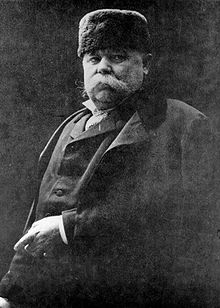Đorđe Krstić
| Đorđe Krstić Ђорђе Крстић |
|
|---|---|
 |
|
| Born |
19 April 1851 Kanjiža, Voivodeship of Serbia and Banat of Temeschwar, Austrian Empire |
| Died | 30 October 1907 (aged 56) Belgrade, Kingdom of Serbia |
| Nationality | Serbian |
| Education | Academy of Fine Arts, Munich |
| Known for | Painting |
| Notable work |
Anatom (1880) Pod Jabukom (1883) |
| Movement | Realism |
Đorđe Krstić (Serbian Cyrillic: Ђорђе Крстић, pronounced [d͡ʑɔ̂ːrd͡ʑɛ kř̩ːstit͡ɕ]; 19 April 1851 – 30 October 1907) was a Serbian realist painter. He is often ranked alongside his contemporaries, Paja Jovanović and Uroš Predić.
Krstić finished his education in Munich, Germany, where he began his early works under the influence of German realism up until 1883. Some significant works of this early period include The Drowning Maiden, Anatomist, and The Gospel Writer. In Serbia, Krstić moved his style of painting from a realist tone to a more idyllic one, with paintings such as Kosovo Field Landscape, From the Surroundings of Čačak, From Leskovac, Studenica, and Žiča. In his later years, Krstić began painting a number of iconostases in Čurug and Niš, of which include the controversial Death of Prince Lazar.
He is included in The 100 most prominent Serbs.
Drowned, 1879
Na izvoru, 1882
Свети Сава Благосиља Српчад, 1891
Бабакај, 1892
...
Wikipedia
